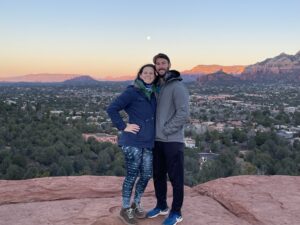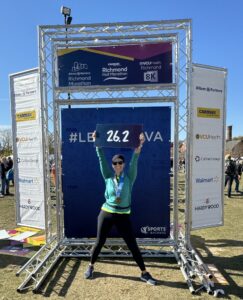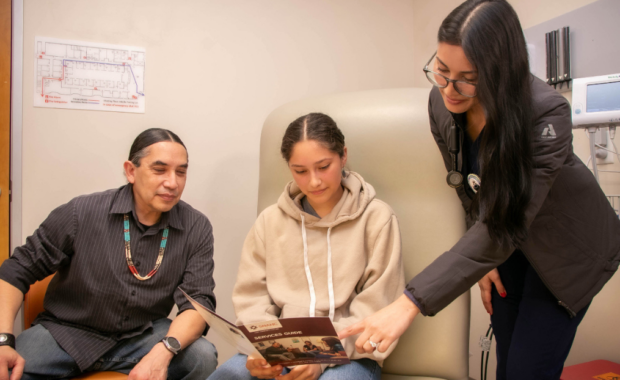During Her First Marathon, PA Melissa Volpe Stopped to Save the Life of a Fellow Runner
Volpe now advocates for widespread CPR training and the use of automated external defibrillators to improve health outcomes
January 31, 2025
By Jennifer Walker

During the Richmond Marathon in November 2023, emergency medicine PA Melissa Volpe quickly jumped into action when she caught sight of a man on the ground around mile 13. Volpe, who was running the 26.2-mile race, hurried to the location, where a bystander had already started CPR. “I stepped in and said I was a PA in the ER, and I took over the scene,” said Volpe, who works at Sentara Martha Jefferson Hospital in Charlottesville, Virginia.
From there, Volpe led about five other people in giving CPR to the runner. She tried to locate an automated external defibrillator (AED)—a small box with two pads through which shocks can be delivered to those who experience a cardiac event—but she was unable to find one. An ambulance came within 15 minutes. Once the runner was in their care, Volpe resumed the race and finished. Later, thanks to social media, she learned that the runner survived. She has since attended a few meet-ups with him, his family, and the small group of people who provided CPR.
During the group’s get together last January, the Richmond-Times Dispatch covered the gathering. The story identified the survivor as David Griffin, age 48. Griffin told the media that he has bicuspid aortic valve, a congenital heart defect, which he did not realize before the marathon. According to the story, Griffin said he “never felt better” on race day, but that quickly changed around the halfway point. He told his running partner that he didn’t feel well. “As he turned around to see what I was talking about, I was already going down,” Griffin said. Volpe and the group of bystanders had to act quickly to help save Griffin’s life.

It was from this experience that Volpe found a new goal: spreading the word about the importance of widespread CPR training, as well as the use of AEDs. More than 350,000 cardiac arrests happen outside of the hospital each year, but only 40% of the people who experience these events get help before professionals arrive, according to the American Heart Association. When performed quickly, CPR can double or triple a person’s chance of survival. Using an AED in conjunction with CPR offers the best outcomes for cardiac arrest patients.
“One of the most important things in CPR is having access to an AED. The later you use one, the less likely a person is going to survive a cardiac arrest,” said Volpe, adding that the device was not available to the survivor until the ambulance came, more than 10 minutes after he collapsed. “It’s miraculous that the runner was able to survive with the delay [in accessing] an AED. I think that shows he was pretty healthy as a runner, generally speaking, and that he had fast action from bystanders, including great CPR.”

Responding at the Scene
After announcing herself as a PA, Volpe took over managing the CPR for the runner. After taking a turn, she coached others to step in and continue. Volpe told them when to push harder, use more recoil, or take weight off the chest between compressions. If it looked like they were getting tired, she told the next person to take over. “I was trying to be a good support system,” she added. The group—including a cardiologist, a law enforcement officer, nurses, and a race coach—helped give CPR until the ambulance arrived.
After Volpe rejoined the race, she said, “I was constantly thinking about the other runner and hoping he made it and wondering if I would be able to find out the outcome.” She had an adrenaline drop about two miles later, but for the most part, she was in good spirits. She ran the rest of the race with the cardiologist who had also stopped to help with the medical emergency. He encouraged her to reach the finish line. “It’s definitely nice to have a community in the running world where you have that support,” she said.
Finding a Cause
After the marathon, a reporter from 12 On Your Side, a multi-media company in Central Virginia, wrote a story about Volpe and the assistance she provided to the survivor during the marathon. The race coach who helped at the scene saw the story and was able to connect with Volpe through social media. This is when Volpe learned that the survivor wanted to meet everyone who helped that day to thank them.
 The group got together before last Thanksgiving. “It was special to be able to meet other people involved and to see the survivor make a fantastic recovery,” Volpe said.
The group got together before last Thanksgiving. “It was special to be able to meet other people involved and to see the survivor make a fantastic recovery,” Volpe said.
This is also when Volpe got an opportunity to talk about AEDs with the law enforcement officer who was at the marathon scene. When she was an EMT in New Jersey and Pennsylvania, Volpe had contact with law enforcement officers who had AEDs in their vehicles. But the law enforcement vehicle at the marathon didn’t have an AED. Volpe learned that AEDs are not required to be in all law enforcement vehicles in Virginia.
“I was surprised by that,” she said. “I have since written to legislators in Virginia to see if something can be passed to require AEDs in all law enforcement vehicles in the state.” She plans to reach out with a local official in Charlottesville to see if she can get more support for this issue.
Volpe also now champions CPR and first response training among the public. “That’s something that everybody can learn,” said Volpe, who has a long-term goal of completing a full Ironman, which includes a 2.4-mile swim, a 112-mile bike ride, and a marathon. “The quicker somebody gets CPR and the better CPR somebody gets significantly improves their outcomes. It’s lifesaving.”
Jennifer Walker is a freelance writer in Baltimore, MD. Contact Jennifer at [email protected].
Editor’s Note: This article was originally published in February 2024.
You Might Also Like
PA Olivia Bell Celebrated the 20th Anniversary of Her Open-Heart Surgery by Running the New York City Marathon
Texas PA Helps Expand Donor Pool for Heart Transplants
Getting to the Root of Cardiac Threats, and Addressing Them Healthily
Cardiology PAs Get to the Heart of the Matter
Thank you for reading AAPA’s News Central
You have 2 articles left this month. Create a free account to read more stories, or become a member for more access to exclusive benefits! Already have an account? Log in.



